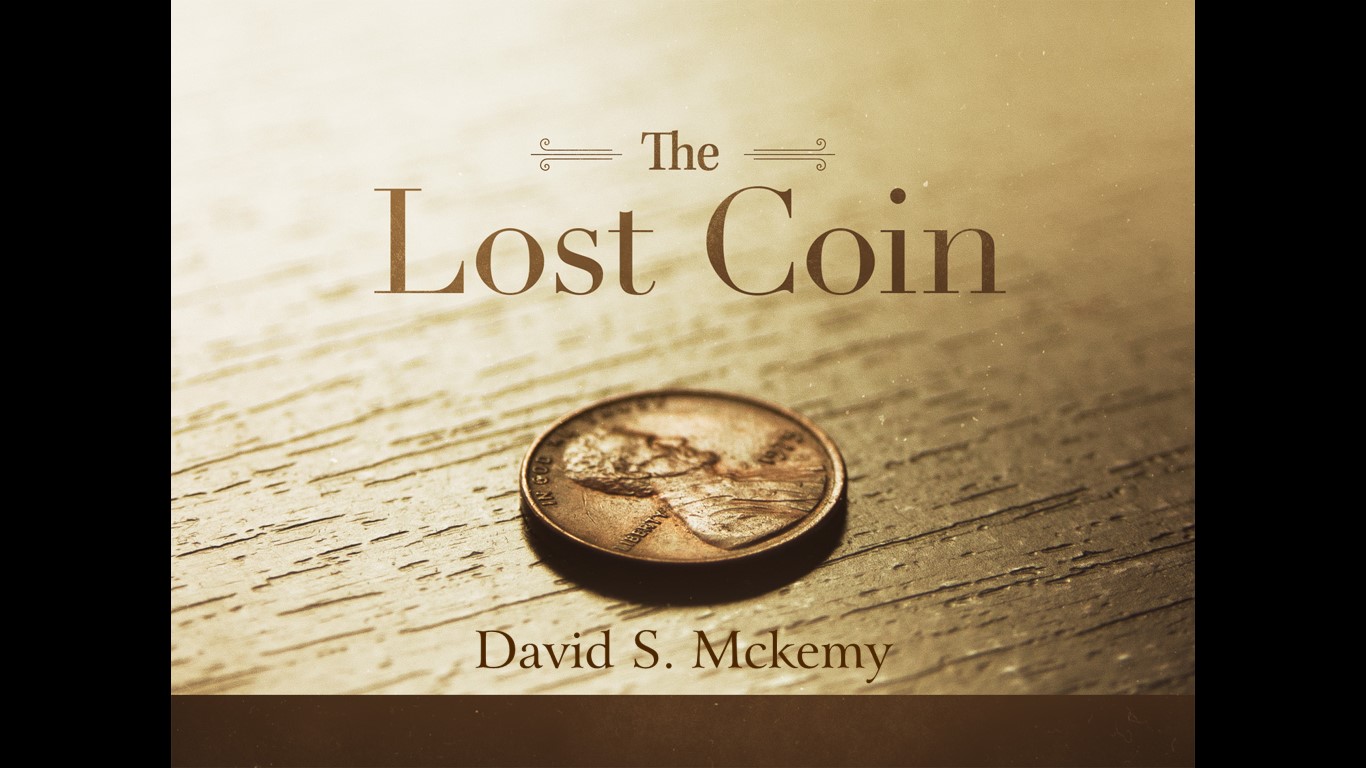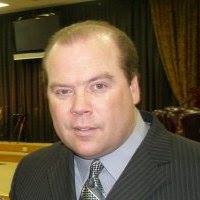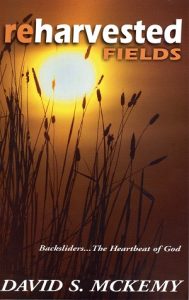David S. McKemy
Luke 15:8-9
“Either what woman having ten pieces of silver, if she lose one piece, doth not light a candle, and sweep the house, and seek diligently till she find it?
And when she hath found it, she calleth her friends and her neighbors together, saying, Rejoice with me; for I have found the piece which I had lost.”
Of the three parables in the fifteenth chapter of Luke, this story is the shortest. Yet the message Jesus gives us in these two passages is powerful beyond measure. A couple of things can be said about this parable. First, it identifies two different kinds of backsliders.
The One That Never Left
There is an ability to backslide and be lost and never leave the church. This is the person that died a slow spiritual death but never showed the outward signs of their departure. They sat in the same pew, looked the same way, and came to church with everyone else. But something inside of them had died.
In the parable, the coin was very much lost even though i I never left the house. This shows us there’s definitely a possibility of backsliding in the pew. Anytime there’s a death, the body begins to decay and stink. The decay becomes much worse over time, and it is obvious to everyone a death has occurred.
The spirit of a backslidden person that never leaves the church is usually a very rotten one. They will become bitter and indifferent. They will begin to show a rebellious nature and deliberately defy authority. They have a cause they try and crusade many times. They eventually become a thorn in the side of the leadership.
I was in Mississippi preaching one time in a very small community. When I arrived on Sunday morning, I was greeted by what I thought was an usher. However, I soon found out that he had a stack of petitions and a letter trying to persuade the people to run the pastor off.
I shook hands with the man not realizing what he was doing, and we greeted one another. I stood there and small talked with him for a few minutes and then glanced down at what he had just handed me. I assumed was a bulletin. Once I saw what it was this man was passing out, I looked up at him and asked him if he had anymore of these I could have. He eagerly handed me a large stack of them and said he appreciated any help I could give him. I kindly told him I would give him more help than he thought he would get out of me.
I sat my Bible down and carefully began to rip the petitions in half. He got very upset and asked what I thought I was doing. I explained that I was doing him the best favor he would get all day. I told him he was out of line and would pay a high price for rising up against the ministry. This man was a lost coin in the house of God. He got mad and stomped off leaving his entire stack of petitions lying on a table. I picked them up and took them to the pastor.
That morning the man sat in the service with a tape recorder held up letting me know he was taping the service. I later found out he tried to file charges against me with the District Superintendent of Mississippi who supported me one hundred percent. Not only did he support me, he proceeded to rebuke the man for what he was trying to do.
The sad thing was that this man was lost and had no clue of the danger he had put himself in. Yet the Lord reminds us He cares about all of the lost including the lost coins that have never left and don’t realize they are lost. The only way to reach the lost coin is to sweep the house. The word of God is the best broom I’ve ever seen. It exposes and reveals things that are tucked back under a chair or cabinet.
The lost coin is mixed in with all the dirt and grime you are trying to get rid of. Yet there is worth in that lost person, and they are valuable to God. There is a thin line here. We must reach as hard as we can and at the same time stand firm and strong for what’s right. We must not bend or compromise to the demands put on us by a lost coin that has a cause.
The choice of being saved remains with them, and we must maintain a burden for the soul of this person. The woman in this parable was very diligent and wouldn’t give up looking for the coin until she found it.
Usually a person that causes a stink in the church is someone who has died a spiritual death. Yet they have a soul. But if allowed to mix with the rest of the church, a dead body will kill a living one if becomes attached to it. Great wisdom must be used here. Salvaging the innocent and yet reaching for the guilty must be done carefully.
There is the ability to go to church and yet not know God. You can look the part, know the right things to say, even dress the part, and still have no relationship with the Lord.
1 Samuel 3:6-7
“And the LORD called yet again, Samuel. And Samuel arose and went to Eli, and said, Here am I; for thou didst call me. And he answered, I called not, my son; lie down again.
Now Samuel did not yet know the LORD, neither was the word of the LORD yet revealed unto him.”
Samuel had grown up around the things of God. He lived in his house with Eli. He knew how to fit in and look the part. He could probably have impressed you with his knowledge of scripture and history. He just didn’t know God! So going to church isn’t an assurance of being saved, it takes a relationship with God! This is a very dangerous place to be. You can be a fourth generation Christian and it means nothing to God unless you have a relationship with Him. That’s all that matters to God.
I recall another time when I was preaching in Texas. A backslidden church secretary controlled the church. He wouldn’t even come into the services. He’d sit back in his office and wait on the ushers to bring him the offerings to count.
This man bragged to me about the wealth of this church and how everything they had was paid for. He bragged that they had hundreds of thousands of dollars in the bank. The pastor expressed his fear of this man. He was afraid of crossing him. One night the Lord gave me a message for this church, and we had an incredible move of the Lord. Nobody had received the Holy Ghost in over two years. We had nine to receive it that night. I’d asked the leadership to join me in the altar, and this man publicly rose up against me. There was a very strong anointing in the service that night, and I warned the man he needed to repent. He showed his nasty attitude again. The Lord directed me to warn him again. While pointing to the elderly pastor standing behind me, I told the man if he didn’t repent that night, the pastor would be preaching his funeral.
The pastor called me six months later and told me the man had come down with a very aggressive cancer and didn’t last but a few months. I was saddened by this news and bothered that the man chose not to repent. The Lord reminded me it was his choice.
There are people that will never be saved regardless of how much we reach for them. There is a slight minority of these backsliders the Bible calls Apostates and outlines what should be done with them. For the sake of the rest of the body of Christ, these people will be disfellowshiped. They’ve become a liability and jeopardize the souls of others. The word is very clear on who these people are and what they’re doing. They are sowing seeds of discord, bringing disunity into the church, and causing strife. There’s no tolerance afforded people like this in the scripture, but as true children of God we certainly pray they will repent and find their way back to God. But until this happens, they must be removed from the flock.
There are also lost coins in the church that will never ca use a problem. Yet their souls are just as lost. They lose their worship and stop praying. They may even have a pride about their humility and the holiness they claim to have. The Bible refers to this kind of holiness as “filthy rags.” They may look the part, but because their heart is not right and their spirits are wrong, they are lost and don’t even realize it. The Lord is carefully showing us He cares about them regardless of where they are; He desires them swept out with the word of God so they can be saved.
While in Louisiana preaching in an old established church, some elder saints began to tell me about a lady they had loved and admired in the church. There were some problems going on at the time but nothing that was major.
One night this lady approached the platform and walked into the pulpit uninvited. She was a meek, mild woman that wasn’t the source of any problems. She said, “I wasn’t going to say this, but now I’ve decided to.” That was as far as she got. The woman fell over dead right there on the platform. The elders telling the story were there when it happened. I remember the perplexed feeling they felt about this. They proceeded to tell me it was the judgment of God that killed her. I finally spoke up and asked them how they knew it was the judgment of God? They stuttered for a moment and said because she was out of line and God killed her.
I asked them whether or not she made the comment that she was about to say something but didn’t actually say it. They agreed that she’d said it that way. They said that God wouldn’t allow her to say it. I told them if she didn’t actually say it then she didn’t actually say anything wrong. Right? They agreed. I told them this wasn’t God’s judgment, it was God’s mercy. He loved her so much that He took her before she had a chance to say something that may have jeopardized her soul. This was perhaps a coin God loved so much that He put it up before it had a chance to get lost.
The second thing that can be said about the parable in Luke 15 is that there was a coin that was lost by someone else.
The Coin Was Lost By Someone Else
This coin did not lose itself; the woman lost it. It was misplaced, dropped, forgotten about, carelessly laid down, or any number of things. The point still remains someone contributed to it being lost.
As far as living for God, everyone has to accept the responsibility of their own soul. However, there are contributors to a person backsliding that may have pushed them in that direction. We have the ability to influence someone to do certain things – good or bad. If we use that influence to do something that’s a stumbling block to someone and that causes them to backslide, Paul says we have sinned against Christ. This is a very serious matter to consider.
It could be a bad attitude or an offense towards this person. Or it could just be a misunderstanding. In most of these things we don’t have a motive; it’s just something that happens. You’re not intentionally trying to hurt someone else and you do. This becomes their stumbling block, and they lose out with God. We share the blame in them backsliding. Let’s look at what Paul says about this.
1 Corinthians 8:9-13
“But take heed lest by any means this liberty of yours become a stumblingblock to them that are weak.
For if any man see thee which hast knowledge sit at meat in the idol’s temple, shall not the conscience of him which is weak be emboldened to eat those things which are offered to idols;
And through thy knowledge shall the weak brother perish, for whom Christ died?
But when ye sin so against the brethren, and wound their weak conscience, ye sin against Christ.
Wherefore, if meat make my brother to offend, I will eat no flesh while the world standeth, lest I make my brother to offend.”
All holiness teaching in our churches is not the same. Some churches are stricter than others. Personal convictions are the same way; some people have a personal conviction everyone else doesn’t share. I’ve heard all the arguments against of all kinds of activities that many of us shun stay away from. There are things that we’ve felt weren’t right to do, yet others feel a liberty and freedom to do them.
Let me give you a bit of a warning. Paul is saying something to all those that live closer to the edge and decide to do the things that might be in a gray area. He’s speaking to those of you that feel you need the Bible to say “thou shalt not do that” before you will believe it isn’t a good thing to do.
According to Paul, eating the meat that had been sacrificed to idols wasn’t a sin. There was much debate in this period of time as to whether or not it was a sin. However, he’s telling the person who’s sitting down to eat this, that even if it isn’t a sin to eat, if you do this and cause a weaker brother to fall, you have sinned against Christ.
Eating the meat still hasn’t become a sin, but causing the weaker brother to fall is. So you can do things that aren’t sin, but if it causes a person to be lost, you have not only sinned, but you also made something happen you may or may not be able to fix. That’s why pastors don’t feel they need scripture and verse for everything they take a stand against. There are some things that may not be sin, but have the potential to cause the weak to fall.
I am pointing this out for more than one reason. Since you’re reading this book, you obviously want to reach the backslider and have a burden for the things of God. I tell you this as a warning be careful and never make a brother fall.
I also ask that you stop here for a moment and ask yourself a question that only you, God, and the person involved know the answer to. Ask yourself this: Have I ever done anything in word or deed that has been a stumbling block for my brother and caused them to fall into sin and to be lost?
This is a very serious question, and if you’ve done this you have a responsibility to go to the person, repent, and tell them you were wrong. It could be that your apology is the very thing that causes them to be open to God to restore their soul. Regardless if they come back or not, you have done your part in making this right; now the rest is up to them!
The above article “The Lost Coin” is written by David S. McKemy. This article was excerpted from chapter eight in McKemy’s book Reharvested Fields.
The material is copyrighted and should not be repainted under any other name or author. However, this material may freely be used for personal study or purposes.





1 thought on “The Lost Coin (Entire Article)”
Comments are closed.